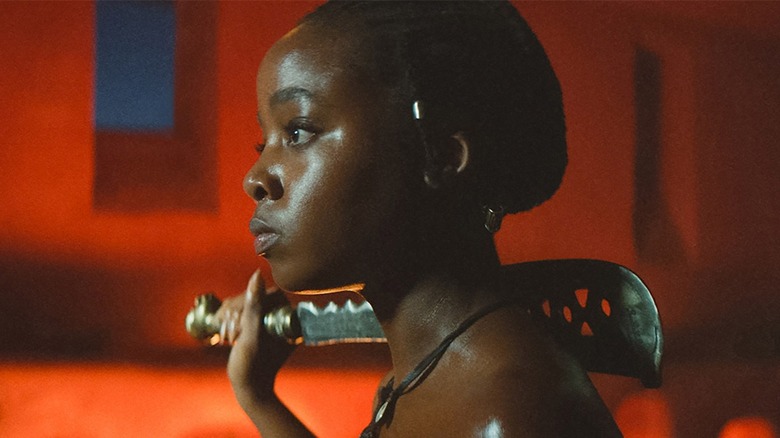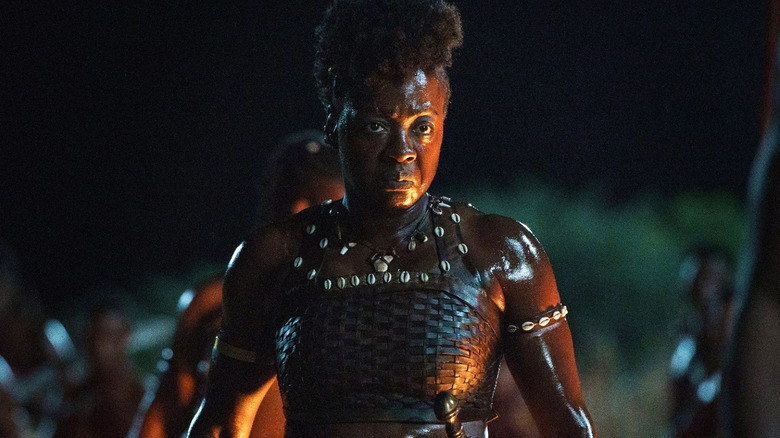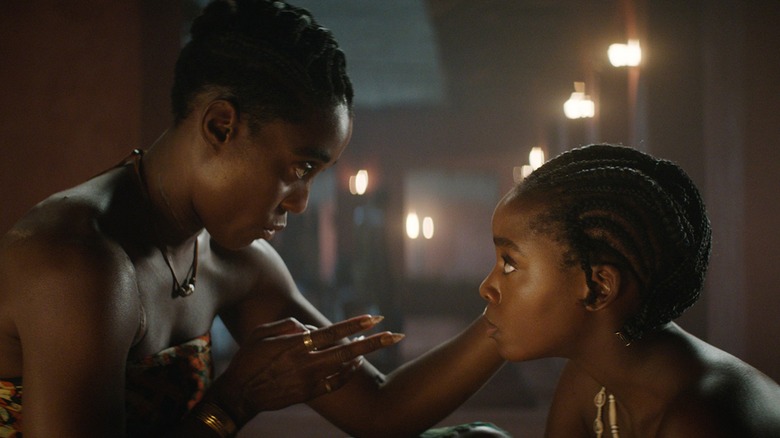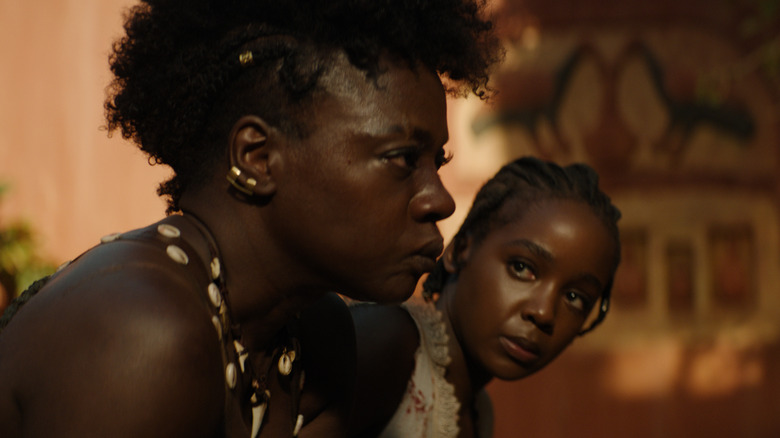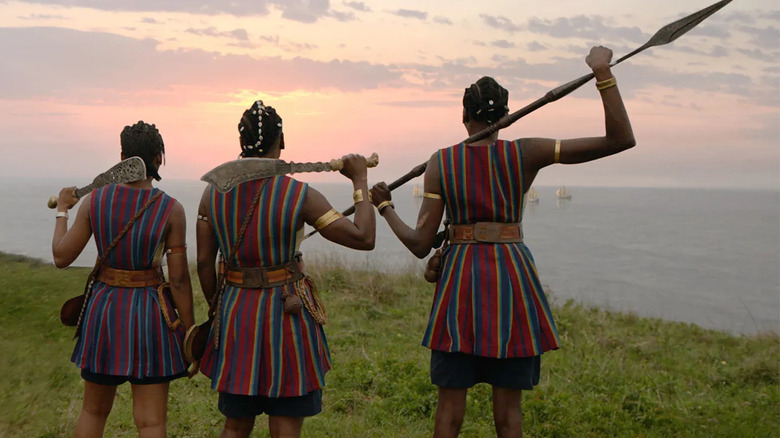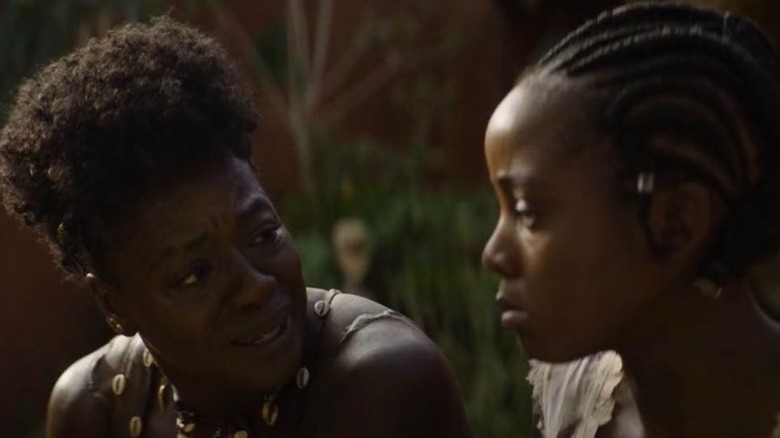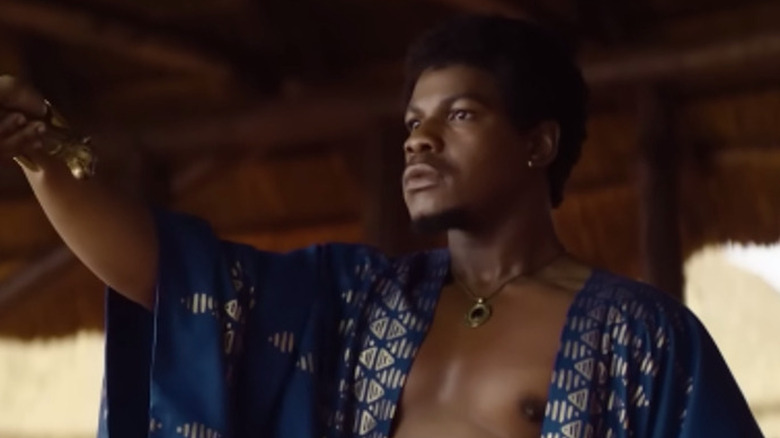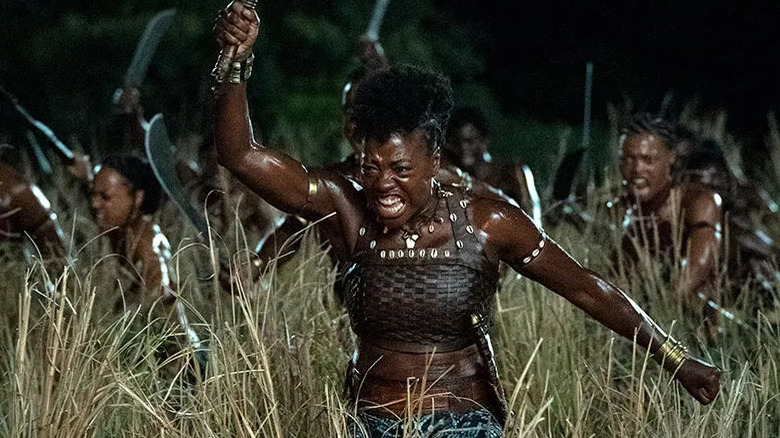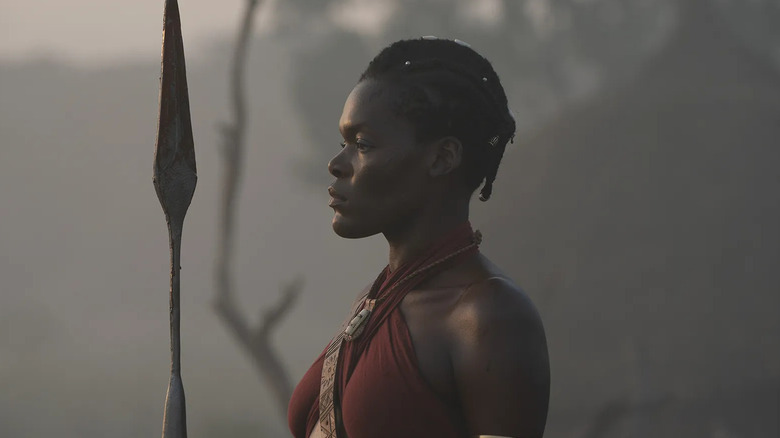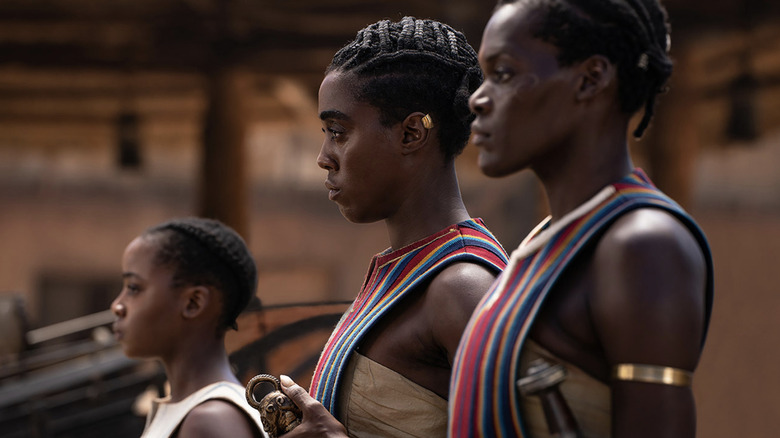The Ending Of The Woman King Explained
Residing comfortably in the sweet spot between historical drama, action and entertainment is "The Woman King," a thrilling epic starring Viola Davis ("The Suicide Squad,") Lashana Lynch ("No Time to Die,") Thuso Mbedu ("The Underground Railroad,") and John Boyega (the "Star Wars" sequels), written and directed by "Love & Basketball" mastermind Gina Prince-Bythewood.
"King" is centered on General Nanisca (Davis), the leader of a tribe of legendary female warriors called The Agojie. From the African kingdom of Dahomey, they are led by the newly-appointed young King Ghezo (John Boyega), who Nanisca and The Agojie helped come to power.
But when the tribe utilizes the slave trade to achieve power, Nanisca convinces Ghezo to stop trading other Africans to the Europeans. This, of course, causes the kingdom of Dahomey to become a threat not just to the Europeans, but also their rival African tribe (the Oyo) led by the cruel, newly-appointed general Oba (played by Jimmy Odukoya, "One Call Away,"). Meanwhile, a new crop of young girls are being trained to be the new generation of Agojie warriors, with Nanisca taking a shine to Nawi (Thuso Mbedu,) who she sees as reminiscent of herself.
While "The Woman King" refers to itself as "inspired" by real events, what it lacks in historical accuracy it makes up in terms of being a big-budget historical epic with diverse representation both in front-and-behind the camera. After all, it's certainly not the first time historical figures have been sanitized for modern audiences.
After the credits roll, you may find yourself asking: What does the ending of "The Woman King" really mean? Are there possible sequels that could be produced from this story? What were the themes, and how well were they implemented by the end? Read on for a (spoiler-heavy) breakdown of the film's intriguing final moments.
Possible sequels
It's true that historical epics rarely get sequels; however, they are not unheard of.
There was "Robert the Bruce," a sequel to "Braveheart" with actor Angus Macfadyen reprising his role as the titular Robert the King (even if might not be canon). There is also the upcoming "Gladiator 2," which had a script written by Nick Cave that got scrapped, and now has a screenplay from Peter Craig (co-writer on "The Batman"). Regardless, even if there weren't sequels to historical epics, there's nothing saying that it couldn't happen eventually.
There are many ways "Woman King" could produce a sequel, based on how the film ends. It's even easier than the other examples mentioned, since Viola Davis' Nanisca survived at the end, unlike the other two. For instance, there could be other would-be conquerors in Africa trying to attack the Agojie and the Dahomey Kingdom. Furthermore, there could even be possible European retribution, which historically happened later on in the real timeline. Depending on the box-office success of the film, there's no reason there couldn't be further adventures of General Nanisca and her warrior Amazon women.
It would be particularly interesting now that she's a king, and it could even deal with her trying to manage both her royal and political duties, in contrast to her military and soldierly ones. It could hearken back to classic stories of heroes becoming kings, like the aforementioned "Robert the King" or even classic stories such as "Conan the Barbarian," who became king in the later books.
Female empowerment realized
Female empowerment is a major theme, made clear from the very premise itself. But it goes much deeper than that. There is a derisive name for a trope in modern cinema called "Trinity Syndrome." Essentially, it's when "strong female characters" are usurped (or even killed) to give the male hero something to surpass or avenge.
Things have gotten better lately, and this film mostly comes out unscathed. Instead of having a capable, powerful female character be the sidekick to a less capable male hero, the film follows Viola Davis' General Nanisca throughout the entire film — she is the focus of the story, she defeats the main villain in the climax, she has the emotional arc — until she saves the day and becomes the titular Woman King by the end.
The film also reiterates the themes of female empowerment by having the female characters — particularly the Agojie warriors — work together as a team, building each other up rather than tearing each other down. Even a rivalry between Nawi and Ode (Adrienne Warren, "Orange is the New Black") during training is short-lived, used to fuel their eventual trust and camaraderie. The ending mostly sticks the landing of showcasing and celebrating this theme of female empowerment.
Potential political intrigue with other wives
While "The Woman King" may deal with female empowerment and camaraderie, not all the female characters get along.
There is an element of class commentary in the film, where Viola Davis' General Nanisca has to contend with the beautiful, but condescendingly ambitious upper-class wife of King Ghezo, Shante (Jayme Lawson, "The Batman"). While Shante is one of many wives of Ghezo, she is also the one that seems to curry the most favor with the young king. She doesn't like Nanisca — the aristocratic Shante sees Nanisca as nothing more than a dirty, common soldier.
At the end of the film, due to her bravery in rescuing captured Dahoney citizens and burning down a slaver outpost, King Ghezo appoints Nanisca as "The Woman King," an equal partner in leading the kingdom of Dahomey — much to the chagrin of Shante, and presumably many of the other regal wives of Ghezo.
This is one of the few plot threads left dangling at the end of the film, and it's interesting to think about what happened after the credits rolled. If there were to be a sequel, it could be entertaining to watch a "Game of Thrones"-esque power dynamic play out in the halls of the Dahomey palace, led by Shante and other disenfranchised wives, to depose Nanisca. As it is, at the end of the film the wives are unilaterally subservient to Nanisca.
Choosing to defend culture over forced assimilation
"The Woman King" is set in the 1820s, when many difficult decisions were foisted upon African tribes, including how to deal with other warring tribes, and how those rivalries helped fuel the Atlantic slave trade. African tribes would often sell captured enemies to the Europeans for protection from being enslaved themselves — and sometimes for riches as well — as depicted in the film.
However, there are also characters throughout the film who have to make decisions about whether to assimilate into newly colonized power structures, or to rebel against them and stick to defending their ancestral culture and home. This is seen through the story of Malik (Jordan Bolger, "The Book of Boba Fett"), a Brazilian half-Black, half-white aristocrat and the unlikely friend of successful slave trader Santo (Hero Fiennes Tiffin, "Harry Potter and the Half-Blood Prince"), who begins the film working alongside King Ghezo in selling captured Africans as slaves.
By the end of the film, it is shown that choosing tradition is better than assimilation or appeasement to a corrupt status quo, especially when considering the barbarism of how colonization enforces their power. This is most exemplified by the dehumanization of the slave trade, which Malik apparently sees for the first time and is appalled at it.
While Malik leaves Africa at the end of the film, presumably back to Brazil, he still defends his African ancestry in the end over his Portuguese colonial friend, Santo, by freeing chained slaves who end up drowning their enslaver — putting his life and reputation on the line to save the life of Nawi.
There is power in love and attachment
At the beginning of "The Woman King," General Nanisca (Viola Davis) is cold and hardened, both by battle and her past experiences as a captured prisoner of a rival tribe. This stoicism allows her to be a great and fearsome warrior — but it also leads her to abhor emotional attachments, especially familial and romantic ones.
In her mind, such attachments make one weak in battle; she says Nawi must essentially "kill her tears," in essence never feeling emotions. This is exacerbated by the Agojie warriors not allowed to have children, with scenes showing Nanisca seemingly longing for one.
But the negative assertion Nanisca has about love gets challenged, and proves to ultimately be false. In the end, her love for Nawi — who she finds out is her biological daughter after she was sexually-assaulted in her youth, and abandoned afterwards — is what gives Nanisca the conviction to go back to a slave post to rescue her when she's captured, ultimately burning the port to the ground and murdering her assaulter.
Nanisca discovers that Nawi and Mikel had a love affair beforehand, and his love of Nawi is what gives him the conviction to keep her safe before the arrival of Nanisca, and is also what ends up saving Nanisca (as Nawi shoots a slaver that had the drop on her). So, by the end of the film, Nanisca has learned to value motherhood, and even romantic love, rather than bottling it up, as she did at the beginning of the film.
Men having to step down for equality
Boyega's portrayal of King Ghezo bears very little resemblance to the real person. In the film, the young Ghezo is relatively progressive — favoring the women warriors of the Agojie, and especially the counsel of General Nanisca (Viola Davis). He even defies the Europeans to end the slave trade in Dahomey, while in reality they were one of the worst slavers in Africa.
But as film historian Andrew Bergman said, "Every movie is a cultural artifact and as such reflects the values, fears, myths, and assumptions of the culture that produces it." For instance, 1960's "Spartacus," ostensibly about a gladiator uprising against the Roman empire, was a sympathetic ode to global Communist uprisings in the late-50s, early-60s (screenwriter Donald Trumbo was an avowed Communist and victim of the HUAC's Black List).
It's iffy how ethical the sanitation of King Ghezo in "The Woman King" is, but it's far from unprecedented. If "Woman King" is about female empowerment and equality, it makes sense that it would also talk about how men must be willing to step aside and not stand in the way of that empowerment. Furthermore, they should go even further and use what privilege they have to help facilitate it.
To the film's credit, the real King Ghezo did rely on and trust a strong group of female warriors, as depicted in the film. His reasons for doing so were may have been less altruistic than depicted, but still, it is something.
The need to fight for social change
In times of great injustice, sometimes violence and upheaval is a necessary step in providing justice – especially when marginalized populations are involved.
We've seen this all throughout history, whether it's with slave revolts (such as the Haitian Revolution in 1804, where the slaves successfully pushed their French oppressors out); the October Revolution in 1917 that deposed a corrupt monarchy; the bombings that occurred to procure the long-overdue women's right to vote in America; or even more recently with things like the Stonewall Riots, where an LGBTQ+ community fought back against police and won, or the six day riots that led to Congress finally passing the Civil Rights Bill in 1965.
That's not to mention wars that were actually fought for freedom from oppression (and not just as foot soldiers for corrupt corporations,) such as the American Civil War, World War II, and The Bay of Pigs. Time and time again, righteous violence and war are sometimes synonymous. As Martin Luther King, Jr. once said "riots are the voice of the unheard." That need for upheaval, revolution, and change, never comes out of nowhere.
So, with the ending of "The Woman King," Nanisca and Agojie lead a slave revolt against a Portuguese slave port, burning it to the ground. The film, in the end, argues that sometimes violent upheaval is the only way to get the corrupt and the powerful to listen and take steps towards true justice.
Celebration of African traditions
One admirable aspect of "Woman King" is how it respects African traditions and spirituality. It doesn't go into depicting grossly stereotypical (and often inaccurate) Hollywood depictions of voodoo, or other racist, fictionalized cliches. It basically takes African spirituality, gods, rituals, mythology and traditions seriously, which is a welcome relief.
One of the most prominent spiritual warriors is Nanisca's close friend and confidant, Ameza (Sheila Atim, "Doctor Strange in the Multiverse of Madness"). Towards the beginning of the film, Ameza does a ritual with nuts and sand to tell Nanisca's fortunes — which turn out to be stunningly accurate. The film plays it agnostically (is it a coincidence the events the ritual predicted happened, or is it from the gods and spirits, as Ameza suggests?) and the ritual itself is not an object of mockery, treated with the same reverence as something like Christian prayer.
By the end of the film, all the predictions that Ameza tells Nanisca end up coming true. This includes the return of Nanisca's abuser (that she ends up killing,) as well as the discovery of her long-lost daughter.
There is even a mid-credits sequence where Ameza does a mourning ritual for her fallen comrades — a great, moving coda for the film.
Fighting needs to be to defend living
At the end of the film — once the slave post is burned to the ground and the Oyo army and the evil General Oba is defeated — Nanisca is allowed to ascend to the throne as the eponymous "Woman King," alongside King Ghezo as equal partners and leaders.
But during the feast after the ceremony, Nanisca is seen eating alone, until Nawi approaches her to dance and celebrate with everyone else. Nanisca initially is reluctant to accept — but when she finally does and lets her guard down, she shares a passionate, rhythmic dance with the rest of the Dahoney citizenry that seems to be a metaphorical shedding of past hatred and pain, as well as perhaps a willingness to let herself finally be happy.
In an even broader sense, the scene shows what fighting should actually be used for — to preserve life, joy, and a connection with others. Fighting for power, riches, or conquest (as the Oyo tribe and the European slavers are shown to do) is bad, and they are punished for it by the end of the film. It is corrupting to the soul, and ultimately self-defeating. Only when you're fighting for love, family and community, is the pain and struggle of war and battle worth it, as the film suggests in it final denouement.
